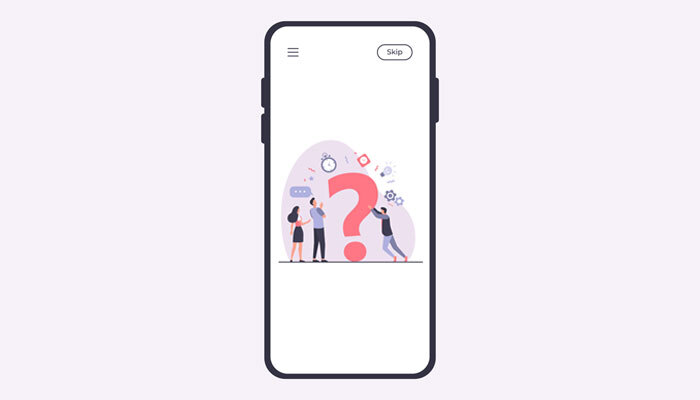Even though millions of applications are created each year, few of them manage to stand out while other leads to mobile app failure. The Google Play Store and Apple App Store both have more than 3.3 million applications available.
The key takeaway is there are millions of available applications, making it challenging to recall names of even a few. Making a successful mobile app is considerably more challenging and chaotic than developing a mobile app.
The idea of a mobile app failure transcends any mistake or fixable problem. Furthermore, a number of problems might ultimately result in an application failing.
Although being aware of all these problems won’t guarantee that your application won’t fail, doing so is still necessary. Instead, keeping all of these things in mind will help you go on responsibly and keep an eye out for any warning signals of failure.
Unable to Solve Real-World Problems
A unique idea is fantastic, but does it actually address an issue in the real world? No one will want to use your app if this is the case. No matter how beautiful it is or how much money you have raised, there won’t be much use in releasing it if no one wants to use it.
Check to see whether your solution offers value above and beyond what others are already doing with their time and money when determining whether or not you are attempting to solve a real-world problem.
Lack of Target Audience Research
Users frequently have their perspectives altered. You may learn more about your target audience by conducting surveys and usability tests. Users won’t utilize your app if they don’t find it useful. Without testing, you risk creating a useless application that won’t succeed.
Before you begin development, do some research to make sure your app is something people will actually use.
Mobile UX professionals can precisely predict how users will behave in a mobile environment by analyzing data gathered from the mobile analytics software, which reveals that certain metrics have an impact on engagement, conversion, and retention rates.
Poor User Experience/ Usability
Some mobile developers continue to believe it is acceptable to request users to complete lengthy forms on a touch screen. It is almost never a smart idea and can irritate users, making them delete your app and hunt for one that is simpler and more user-friendly. Mobile app should be used to perform on-the-go operations that can be accomplished quickly, minimum clicks, shorter forms, easy gesture driven screens, readable fonts and appropriate display of error/ success messages on screen; are a few features that MUST be there to enhance User Experience (UX).
It would also be beneficial if your application has an intuitive user interface that users can understand easily. Otherwise, you run the risk of losing users even before they have been benefited from your product. Try to keep things straightforward; if users find it difficult to utilize your app, they won’t hang there for long.
Unable To Choose the Right Platform
Your first step should be to determine which mobile platform to use—such as iOS, Android, Windows Phone, etc.—is appropriate for your product and target audience. There are advantages to each app platform. For instance, iOS customers prefer to spend more money on applications, even if Android has a wide range of audiences and hardware alternatives.
After selecting a platform, you must ensure that you are effectively developing it. Hire a developer with extensive expertise because not all programmers are equally skilled. They must have a history of success creating apps for that particular mobile operating system.
Poor App Store Optimization
Most people believe that having a presence on Google Play or Apple’s App Store suffices to fulfil their obligations. To create meaningful growth and success, getting an app into those stores is far from sufficient.
Although it’s not a one-and-done process, the metadata you supply to each store at launch will largely determine where your app appears in search results.
You need to think about how your marketing efforts relate to those currently in place from platforms like Facebook and Twitter if you want to attract customers who will download and use your app frequently.
Inefficient Marketing Strategy
You have a serious issue on your hands if no one knows about your fantastic product. As the use of mobile applications rises, many businesses create their products first and consider marketing strategies later, which frequently results in failure.
The greatest method to prevent app failure is to establish a strong marketing plan before beginning development. Before creating an app or mobile website, you should have an idea of who you want to speak with and what you want to say.
Avoid letting a lack of preparation spoil everything! There is no justification for delaying the promotion of your concept when there are so many accessible marketing services available.
Conclusion
Mobile app failure might have a variety of factors. If you want to succeed, make sure to stay away from the above-mentioned frequent mistakes. Your chances of succeeding greatly rise if you steer clear of all of these errors.
Don’t worry if you’re still unsure of what you want to use an app for or why you need one in the first place. Even while many firms find they don’t require one, it never hurts to be aware of your alternatives.
Prologic Technologies is a Credible Digital Agency for Bespoke WebRTC, Mobile & Web App Development, Custom eCommerce Platforms, Telemedicine Solutions, UI/UX Designs, Alexa Skills, and Chatbots.
Explore our services to know more about us.
You can also follow us on Twitter.














